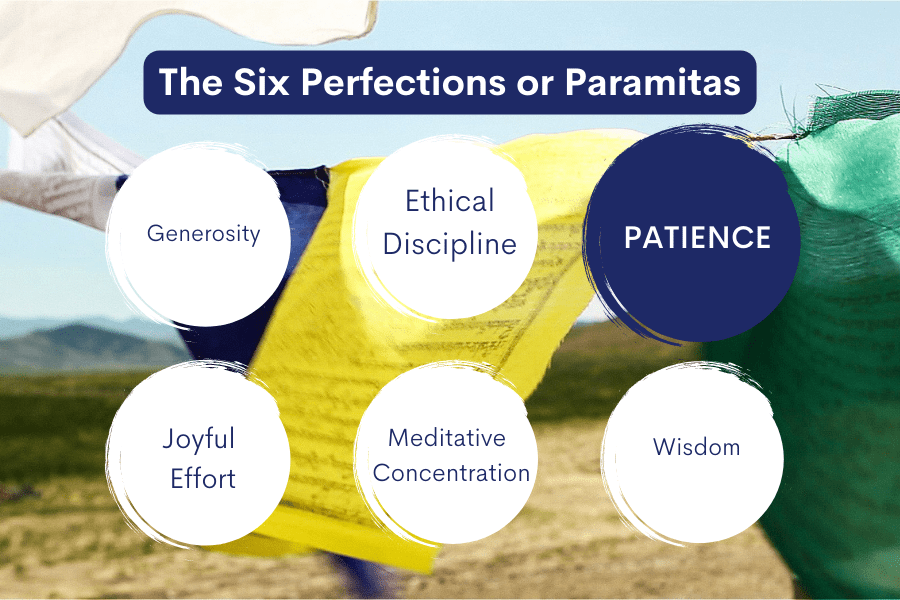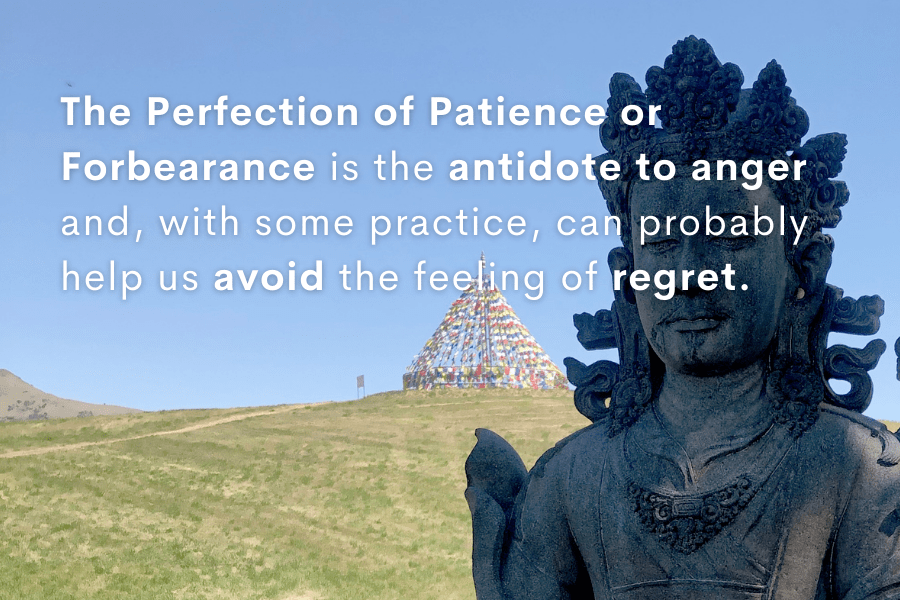
The Perfection of Patience or Forbearance is the antidote to anger and with some practice can probably help us avoid the feeling of regret. Lama Tsomo writes about this in depth in Deepening Wisdom, Deepening Connection.

What is patience?
“Though it’s commonly translated as ‘Patience,’ I actually agree with one translator who uses ‘Forbearance’ instead. Patience implies waiting—sometimes waiting for things to change, or waiting until it’s time for you to do what you have in mind, even if what you have in mind may be ignoble or petty. In other words, you could patiently wait until it’s time to exact your revenge on someone who’s wronged you. Forbearance, though, suggests letting go of your impulse to react to provocation; it’s a ‘yes, but’ perspective.
For example, “Yes, I could see why this might make someone angry, but I’m working on responding with wisdom and compassion.” Or, “Yes, this practice is hard and sometimes tedious and painful, but I’m not going to complain and I’m certainly not going to give up.” Or, “This is a hard and scary truth to face, but I’m not going to turn away from truth.”
The Virtue of Patience
There are three aspects to this Transcendent quality:
1) Forbearance when wronged
2) Forbearing the hardships of Dharma practice
3) Fearless forbearance when looking profound truth—emptiness—in the face
We’ve discussed how essential it is to avoid more splatters on our karmic windshield if we want to reach liberation. There is no worse way to lose virtuous karma (merit) and gain lots of negative karma than by losing our temper. In The Way of the Bodhisattva, it says:
Good works gathered in a thousand ages,
Such as deeds of generosity,
Or offerings to those gone to bliss:
single flash of anger shatters them.
On the other hand, when somebody harms us, if we don’t get angry but instead accept their anger toward us as a way for us to pay off some of our karmic debt, we can turn the experience into a huge benefit for ourselves. Now we need more hands: on the one hand, that karma is now exhausted, so we can feel pleased about that. On the other, we’ve just taken the opportunity to practice Forbearance, which adds to our arsenal for pursuing an upward spiral. If we don’t practice Forbearance at those times, when better? And rather than feeling reciprocal anger at that person, we can feel gratitude for what they gave us: opportunities not only to discharge karma but also to practice a virtue. And the only way to practice Forbearance is to be in a circumstance that would otherwise spark our anger, frustration, or fear.
You might recall Rinpoche’s time in prison as an extreme example of this one. At first, as a thirteen-year-old boy ripped from his family and made by his conquerors to do hard labor, he was extremely resentful. Under the tutelage of one of the greatest “hidden lamas” of the twentieth century, Tulku Orgyen Chemchok, Rinpoche, he came to see that he was paying off lots of bad karma while getting the chance to practice Transcendent Forbearance.
He fully took the opportunity. Not only did it change his karmic balance sheet, it transformed his experience in prison to a happy one! He could even feel compassion for the guards, who were busily sowing the seeds of unimaginable suffering for themselves.
We can use this perspective as a yardstick to measure our progress too. If we continue to be as sensitive as ever to criticism and negative gossip about ourselves, we need to admit our practice isn’t doing us much good. We’re simply not making progress on this journey. On the other hand, despite our distractions in meditation and all the rest, if we find we’re much more at ease with such things, we have real “proof in the pudding” that we’ve made progress.
How to Practice Patience
One metaphor that really helps me to practice Forbearance when I’ve been wronged is to see all of us sentient beings—me too—writhing around in a mud pit. We’re slipping and sliding around with almost no control. It’s crowded, and I accidentally step on somebody’s shoulder. ‘OW!’ they cry. Later I fall down and somebody kicks my ear. OW! What’s the point in getting mad at somebody who’s got no more control than I do?
In his book A Guide to the Bodhisattva Way of Life, the early Indian Buddhist teacher Shantideva gives another metaphor. If someone hits you with a stick, do you get mad at the stick? What’s the point? The stick has no control. How about the hand wielding the stick? Well, neither does the person, who’s driven by anger and is powerless to stop themselves.”
Excerpt from: From Ancient Wisdom for Our Times: Tibetan Buddhist Practice: Deepening Wisdom, Deepening Connection, Namchak Publishing Company LLC p 90-93
Accepting the action of another, or of a situation, can help a great deal with the anger. At the same time, if action is needed, our response will be more effective when not clouded by anger. The anger part is really just the ego-attachment part. It doesn’t seem to help with acceptance.
This doesn’t mean that we never experience anger, but that we can remain unattached to it. In other words, we have awareness of our anger and allow it to pass rather than act out of anger. As we learn to view anger as a passing experience, we can greet our imperfections and the imperfections of others with compassion. This may be to pause a moment before a knee-jerk reaction that would lead to suffering. This, in turn, will more likely bring a good—maybe a great—result, and certainly fewer regrets!
Visit our events page to find more teachings on the Six Perfections!
